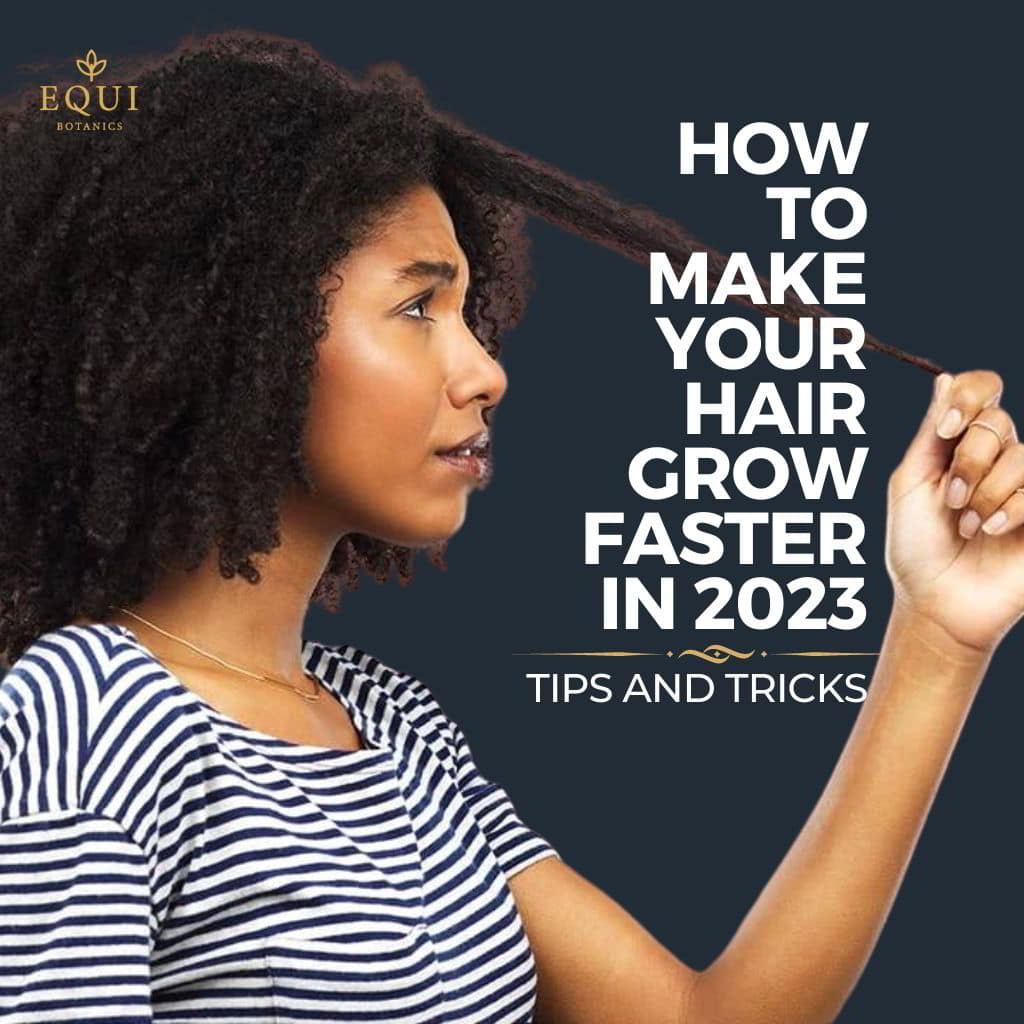
How to Grow Hair Faster | Key Summary
-
On average, the monthly hair growth rate is 0.5 inches but can vary depending on factors such as age, hair type, medication, and hair care products.
Methods for how to make hair grow faster include taking a biotin supplement, performing daily scalp massages, consuming a well balanced diet, and switching to naturally derived hair care.
Avoid falling into the trap of misinformation with myths such as not getting your haircut.
Understanding Hair Growth
Before delving into how to grow your hair faster, it's important to understand the basics of how hair grows and what can impact it. Firstly, let's explore the stages of hair growth:

Hair growth occurs in a cycle consisting of four stages: anagen, catagen, telogen and exogen with each stage playing a specific role in the growth and shedding of hair. Here’s a brief rundown of each stage:
Anagen Phase (Active Growth)
The anagen phase is the active growth phase of the hair cycle. During this stage, the hair follicle is actively producing new cells that form the hair shaft. The duration of the anagen phase varies for each individual and can last anywhere from two to seven years. The longer the anagen phase, the longer the hair can grow.
Catagen Phase (Transition)
The catagen phase is a short transitional phase that follows the anagen phase. It marks the end of active hair growth. During this phase, the hair follicle shrinks and detaches from the blood supply, leading to a cessation of new hair production. The catagen phase typically lasts for a few weeks.
Telogen Phase (Resting)
The telogen phase is a resting phase for the hair follicle. The hair follicle remains inactive during this stage, and the hair is fully formed but not actively growing. Approximately 10 to 15 percent of hair follicles are in the telogen phase at any given time. This phase typically lasts for around three to four months.
Exogen Phase (Shedding)
The exogen phase is the final stage of the hair growth cycle. It is the shedding phase where old hairs are shed to make way for new hair growth. During this phase, the dormant hair follicle pushes out the old hair shaft, allowing new hair to begin growing in its place. On average, we shed around 50 to 100 hairs per day and this is as a result of the exogen phase.
After the exogen phase, the hair follicle re-enters the anagen phase, and the cycle starts again with new hair growth. It is important to note that not all hair follicles go through the hair growth cycle simultaneously, which is why we have hair at different stages of growth on our scalp at any given time.
Hair Growth Rate
Hair growth rate varies from person to person, but on average, hair tends to grow between 0.5 and 1.7 centimetres per month, which translates to approximately 0.2–0.7 inches of growth.
How Long Does it Take for Hair to Grow?
If you are wanting to achieve long term hair growth, this is what you can expect to achieve over time:
3-4 Months of Hair Growth: 2-4 inches
6-9 Months of Hair Growth: 4-6 inches
1 Year of Hair Growth: 6-8 inches
You’ll want to bear in mind that the speed in which hair grows can decline with age but there are also other factors that impact hair growth which we will explore now!
Factors that Impact Hair Growth

Each strand of hair on your head grows from an individual follicle, and although the average person can expect around half an inch of hair growth per month, rates will vary depending on the individual. Let’s take a closer look at what may slow your hair growth down:
Genetics
Genetics play a significant role in determining the rate and pattern of hair growth. The genes inherited from our parents can influence various characteristics of our hair, including its thickness, texture and growth rate, which is why hair growth rates can differ among individuals, even within the same family. While genetic factors provide a foundation for hair growth, other external factors can still influence the overall health and appearance of the hair.
General Health
The general health of an individual greatly impacts the rate at which their hair grows. Factors such as diet (for example if you are vegan), lifestyle, stress, hormonal balance and underlying medical conditions can all affect hair growth. A balanced diet that includes essential nutrients, vitamins and minerals is crucial for providing the necessary building blocks for hair growth.
For instance, protein is a key component of hair, and a deficiency can lead to slower growth or weakened strands. Similarly, inadequate intake of vitamins like biotin, vitamin D and vitamin E can impact the health of the hair follicles.
Age
Age is another factor that influences hair growth. Hair growth tends to be more robust during younger years and gradually slows down as we age. As we get older, the rate of cell division in the hair follicles decreases, resulting in thinner and slower-growing hair.
Additionally, hormonal changes that occur with age, such as the menopause and a decrease in oestrogen and testosterone levels, can impact hair growth patterns.
Health Conditions and Medications
Certain health conditions, surgery, and medications can affect the rate of hair growth. For example, thyroid imbalances, such as hypothyroidism or hyperthyroidism, can disrupt the normal hair growth cycle and lead to hair loss or slower growth.
Similarly, medications like chemotherapy drugs used in cancer treatment can cause temporary hair loss or reduced growth due to their impact on rapidly dividing cells, including those in the hair follicles.
Hair Care Practices
The way we care for our hair can also influence its growth rate and overall health. Excessively using heat styling tools, such as hair straighteners, chemically bleaching or perming hair, and regularly using hair care products with bad ingredients, such as sulphates, can damage the hair shaft and weaken the follicles. Other side effects include dryness, split ends and breakages.
Nutrition and Diet
Maintaining a healthy diet is crucial for promoting hair growth because your hair requires a variety of nutrients to grow and stay healthy. When it comes to what foods to eat to help make hair grow quicker, focus on including protein-rich foods into your diet like:
Lean meats
Poultry
Fish
Eggs
Beans
Lentils
Nuts
Additionally, incorporate foods rich in iron, omega-3 fatty acids, biotin, vitamin C, vitamin E and zinc as these nutrients contribute to the overall health and strength of your hair.
Hair Type
Different hair types, including straight, wavy, curly, and coily, exhibit variations in growth patterns which can impact the growth rate.
Straight hair tends to grow more quickly due to the ease with which natural oils can travel down the hair shaft, providing nourishment and moisture. Wavy hair, with its gentle bends and waves, may have a slightly slower growth rate.
Curly hair, characterised by its coiled structure, often experiences a slower growth rate as the natural oils find it more challenging to reach the hair ends, potentially leading to dryness and breakage.
Coily hair, with its tight coil pattern, tends to have the slowest growth rate, as the natural oils face difficulties reaching the hair ends, resulting in potential dryness, breakage, and shrinkage.
Hair Care Practices
Avoid Excessive Heat Styling
Frequent use of heat styling tools can damage your hair and slow down its growth. If you must use styling tools, reduce the heat and apply a heat protectant before styling.
Gentle Hair Handling
Brush your hair gently, especially when it's wet, to prevent breakage. Use a wide-tooth comb for detangling brush to remove knots without causing damage.
Scalp Care
Nourish your scalp with products containing scalp-stimulating ingredients like peppermint or tea tree oil. A healthy scalp promotes healthy hair growth and minimises shedding.
How to Grow Hair Fast | 7 Tips

While there is no magic product that guarantees rapid hair growth, certain products and ingredients may help improve hair health and support growth. Here are some options to consider:
1. Biotin
Biotin, a B-vitamin, is often recommended for promoting healthy hair, skin and nails. Although scientific evidence is limited, some individuals have reported improved hair growth when taking biotin supplements.
2. Caffeine-Based Products
Some hair care products, such as shampoos or serums contain caffeine, which is believed to stimulate hair follicles and promote growth, however, further research is needed to establish their effectiveness conclusively.
3. Essential Oils
Certain essential oils, including rosemary oil, peppermint oil, and lavender oil, have beneficial effects on hair growth. These oils may improve blood circulation, reduce inflammation, and provide nourishment to the scalp. Use them in diluted form, for example, add to your shampoo, and apply topically.
4. Nutritional Supplements
Supplements marketed for hair growth often contain vitamins (such as biotin, vitamin D and vitamin E), minerals (such as zinc and iron) and amino acids (such as keratin), however, it's advisable to consult a healthcare professional before starting any new supplements to ensure they are suitable for you.
5. Scalp Massage
Gently massaging your scalp for a few minutes each day can stimulate blood flow to the hair follicles, promoting growth. Apply a stimulating product, such as the Black Seed Oil Hair Elixir, which is known for promoting hair growth but will also provide some slip, then use your fingertips to apply gentle pressure in circular motions.
Black Seed Hair Oil Elixir
This Black Seed Oil For Hair is enriched with Fenugreek, Brahmi and Bhringaraj ayurvedic oils, our first hair serum is your best bet to reaching your hair goals. Stop split ends, check. Stop itchy scalp, check. Help accelerate growth, check check check. We've jam-packed this little bottle with luxurious ingredients from the Caribbean, India and the Amazonian rainforest to give you longer, thicker, and stronger hair in less time.
For more on the impact of black seed oil for hair growth, check out our case study, Rosemary, here.
6. Balanced Lifestyle
Managing stress levels is essential for overall health, including the health of your hair. Engage in stress-reducing activities such as exercise, meditation or therapy but also prioritise adequate sleep to allow your body to repair and regenerate.
7. Proper Hair Care Routine
Follow a hair care routine that includes regular washing with a gentle, sulphate-free shampoo and naturally-derived conditioner. Whilst there’s no product that solely works to grow hair, there are certainly many that contain ingredients that will encourage and support hair growth.
We love the Nourish & Revive Set that has all you need to cleanse and condition your hair, supporting its overall health using naturally-derived formulations. Where possible, stick to minimal use of heat styling tools too as this can be damaging to your locks causing breakages and dampening hair growth efforts.
Nourish and Revive Deluxe Set
We've jam-packed this Nourish and Revive Deluxe Set with luxurious ingredients to give you a kickstart on your hair growth journey. We've selected our best-selling and hair replenishing treatments as part of the set. And because we really want you to have a great time, we're giving this set away for less than getting each product individually.
What Makes Hair Grow Faster | Myth Busters

When it comes to hair growth, there are numerous myths and misconceptions that frequently crop up, which can cause confusion and misinformation, but we are here to debunk some common hair growth myths:
Myth 1: Does Cutting Your Hair Make it Grow Faster?
Reality: This is a popular misconception, but cutting your hair does not affect its growth rate. Hair growth occurs from the hair follicles beneath the scalp, not from the ends.
Trimming the ends of your hair helps to remove split ends and prevent breakage, which can make your hair appear healthier and potentially give the illusion of faster growth, however, it does not directly affect the rate at which your hair grows.
Myth 2: Does Hair Grow Faster in the Summer?
Reality: There is a widespread belief that hair grows faster during the summer months, but this is not supported by scientific evidence. Preliminary studies have not found a significant correlation between hair growth rate and seasonal changes.
Factors such as genetics, overall health, and hair care practices have a more significant impact on hair growth than the season.
Myth 3: Brushing Your Hair Frequently Promotes Faster Hair Growth
Reality: Brushing your hair can help distribute natural oils and detangle it, but excessive brushing or aggressive brushing can actually lead to hair breakage and damage.
It is important to use a gentle brush or comb and avoid brushing wet hair, as it is more susceptible to breakage. Brushing alone does not stimulate hair growth.
Frequently Asked Questions (FAQs)
What Causes Hair to Grow Faster than Normal?
There are a few factors that can contribute to hair growing faster than the average rate including genetics, a healthy, nutrient rich diet, and increased blood circulation as a result of exercise and good hair practices.
Can I Make My Hair Grow Faster Overnight?
Unfortunately, there is no magic solution for overnight hair growth. Hair growth is a gradual process that requires time and patience but by implementing healthy habits, such as a balanced diet and proper hair care, you can promote optimal hair growth over time.
Can Stress Affect Hair Growth?
Stress can impact hair growth as excessive stress can disrupt the hair growth cycle and lead to hair shedding or slower growth. Managing stress through relaxation techniques and self-care practices can help maintain a healthy hair growth environment.
Can Certain Hairstyles or Hair Accessories Affect Hair Growth?
Tight hairstyles or hair accessories that pull on the hair, such as tight ponytails or hair extensions, can cause tension and strain on the hair follicles, potentially leading to hair breakage or traction alopecia. It's important to avoid excessive tension on the hair and opt for loose or gentle hairstyles to maintain healthy hair growth.
Conclusion
While hair growth rates are influenced by a variety of factors, incorporating healthy habits and adopting a well-rounded hair care routine are two of the most important ways to support faster hair growth. Prioritise a nutritious diet, avoid damaging hair practices, and consider using supplements that promote hair health as well.
Remember, you can’t expect your hair to grow overnight but with patience and consistency, you will be well on the way to growing long, healthy hair.


